Major Henry Charles David Marshall - Wallet 1 - Booklet 4 - Part 2
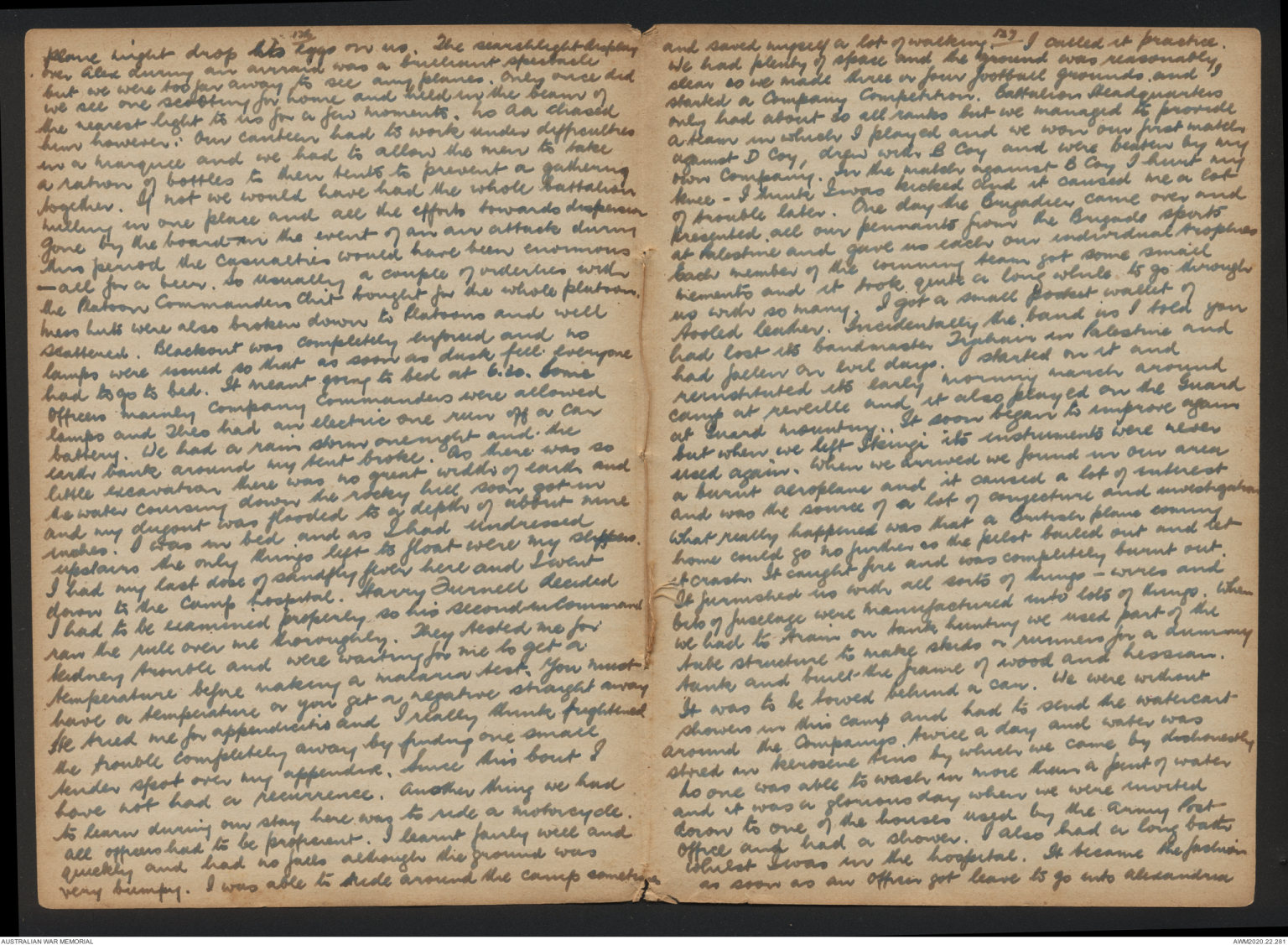
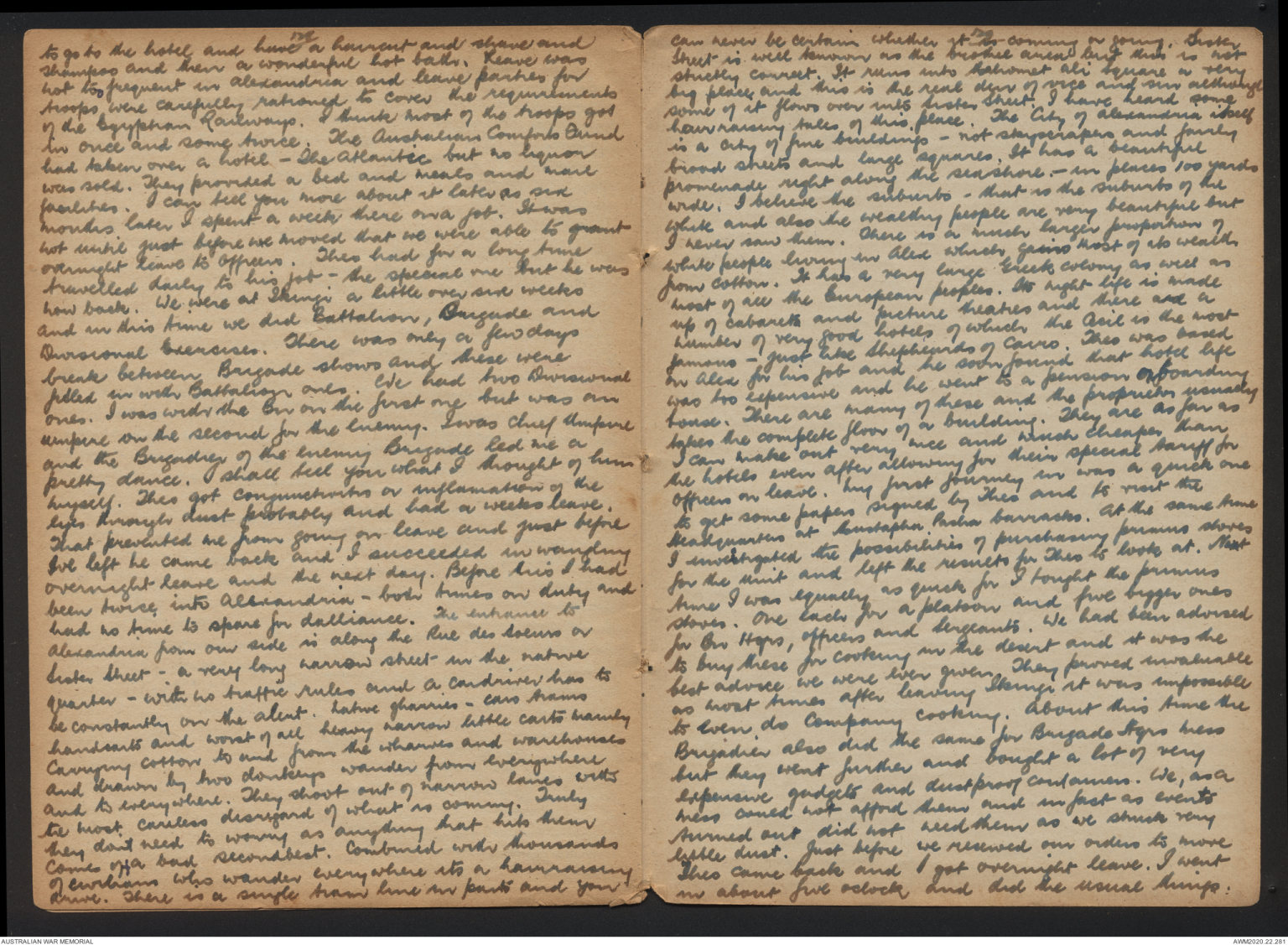
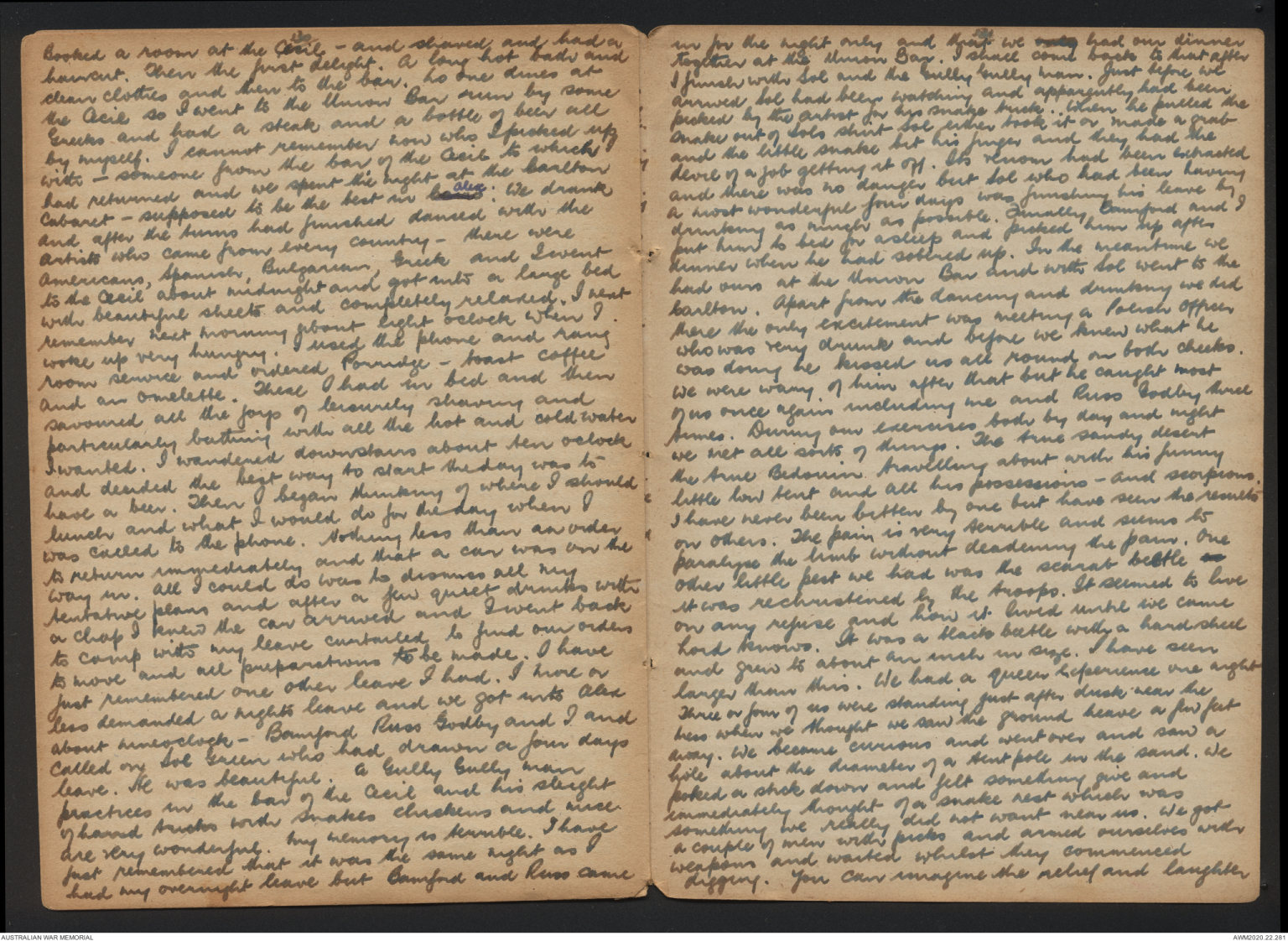
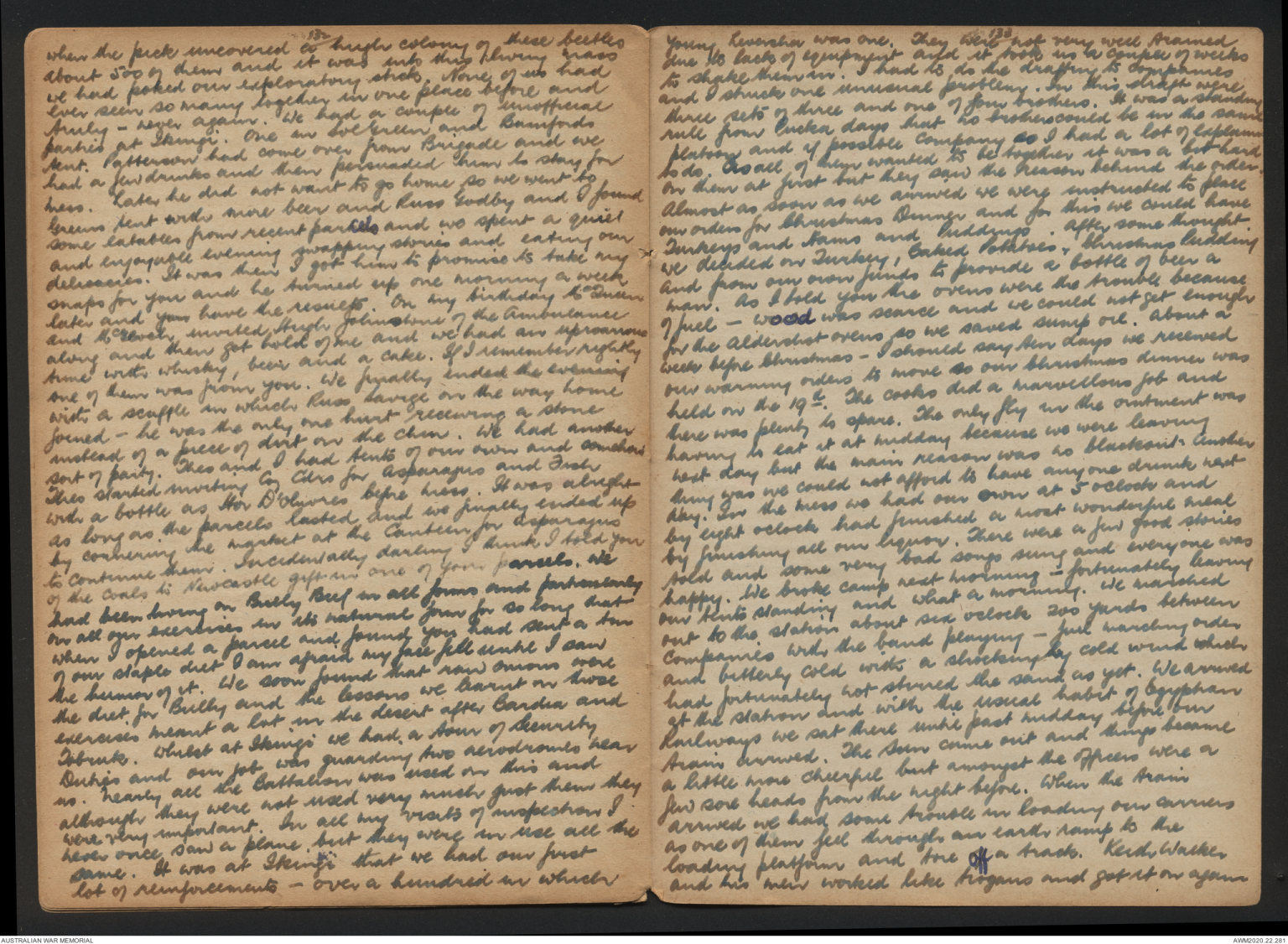
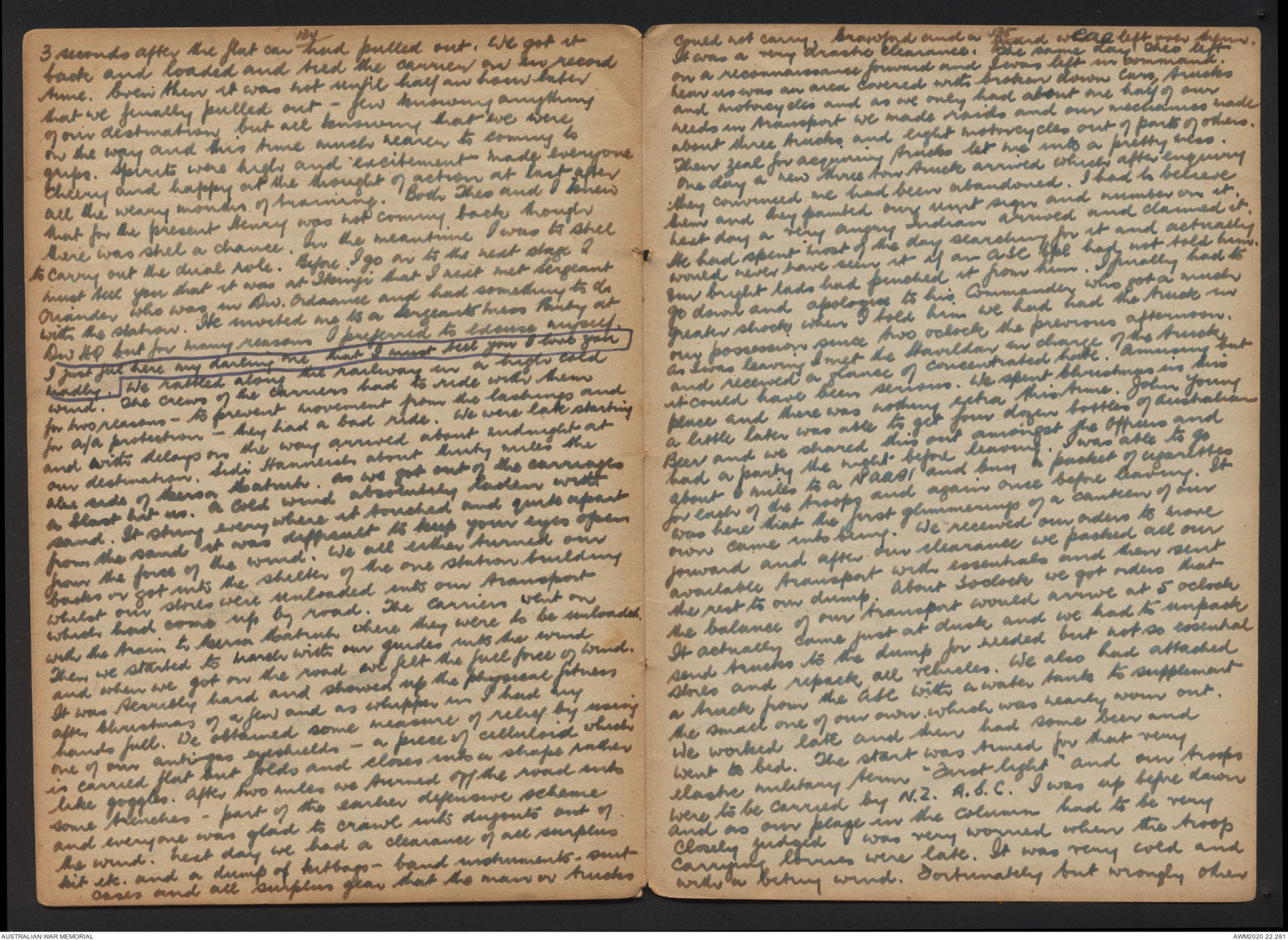
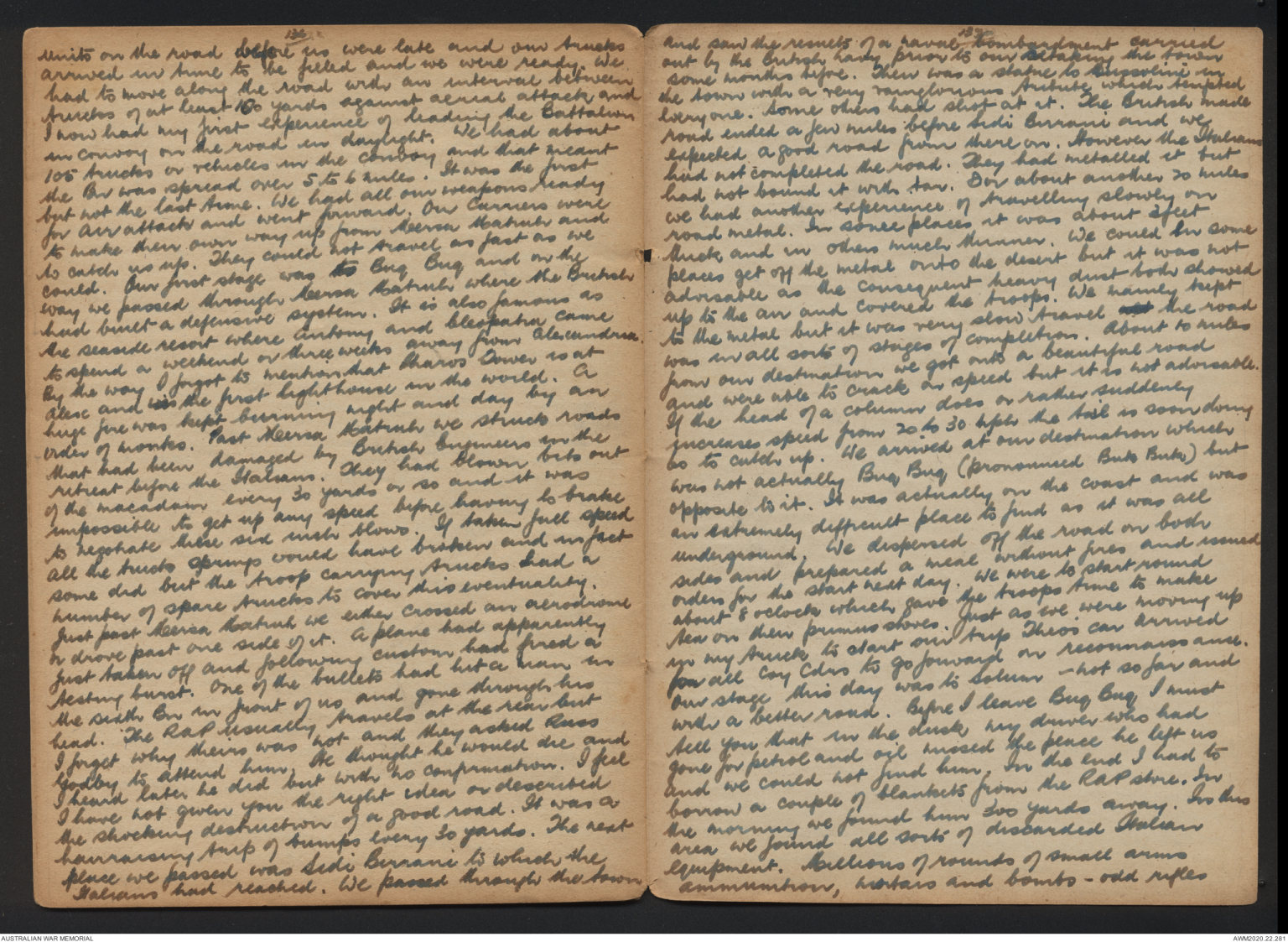
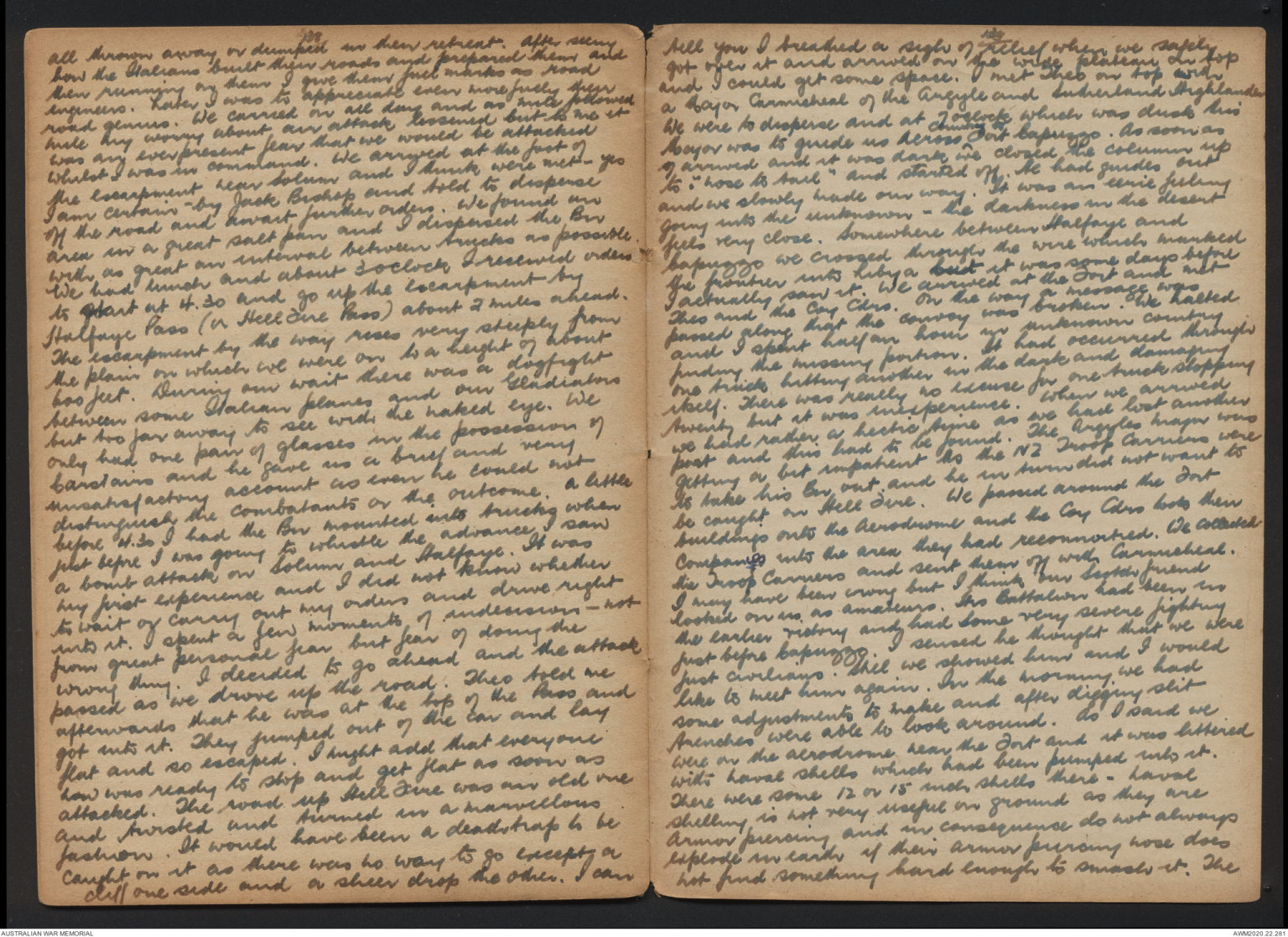
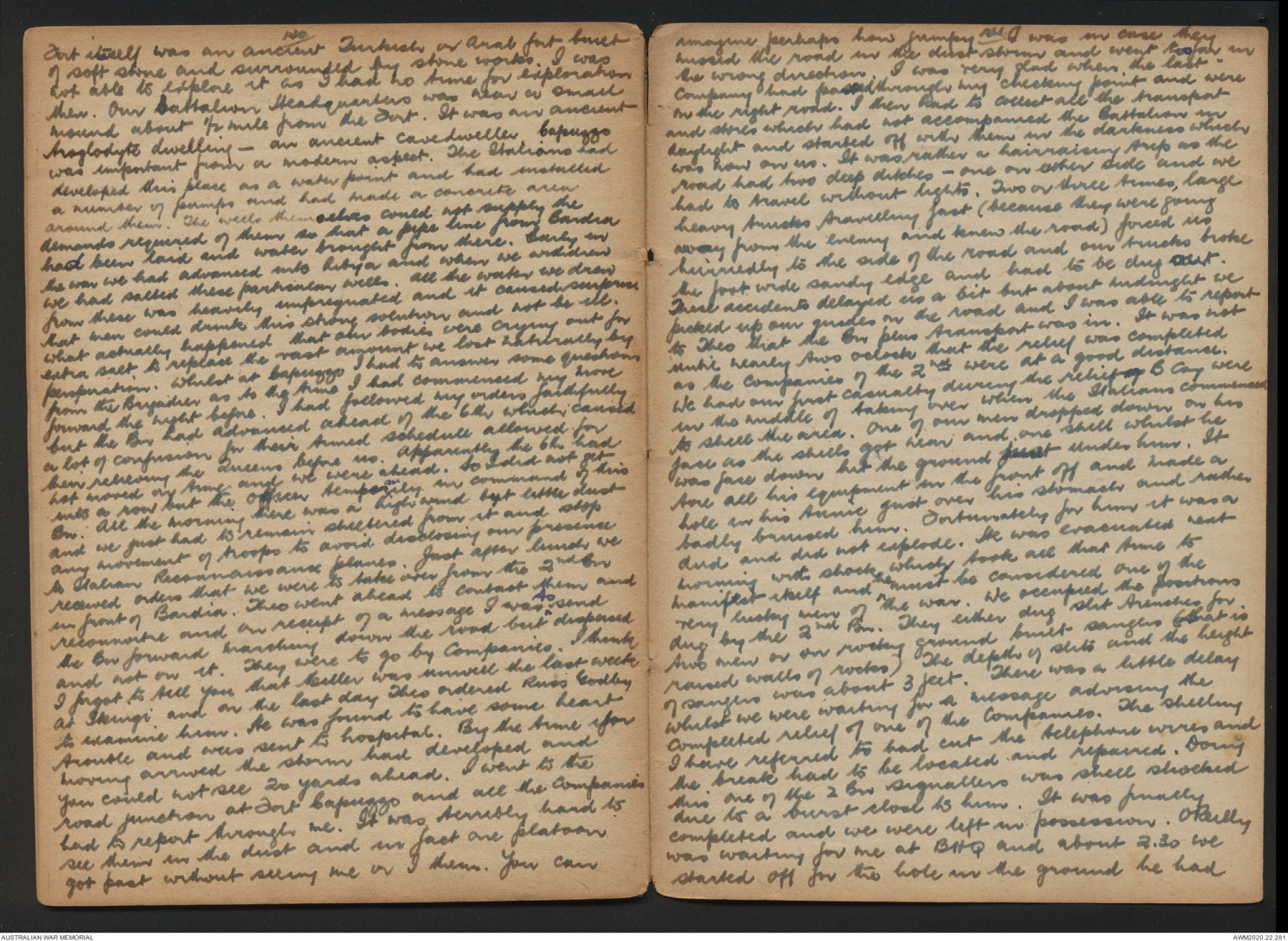
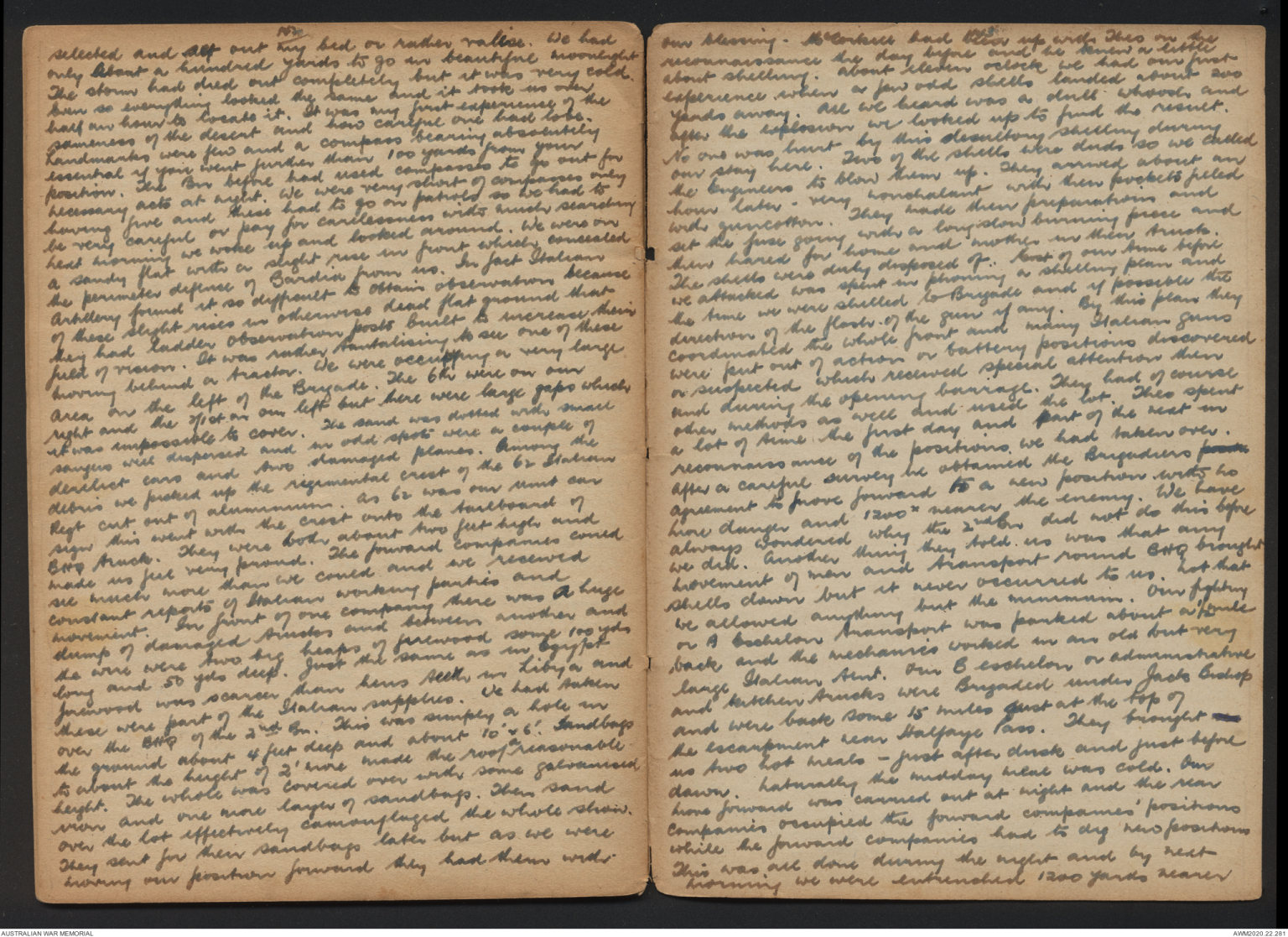
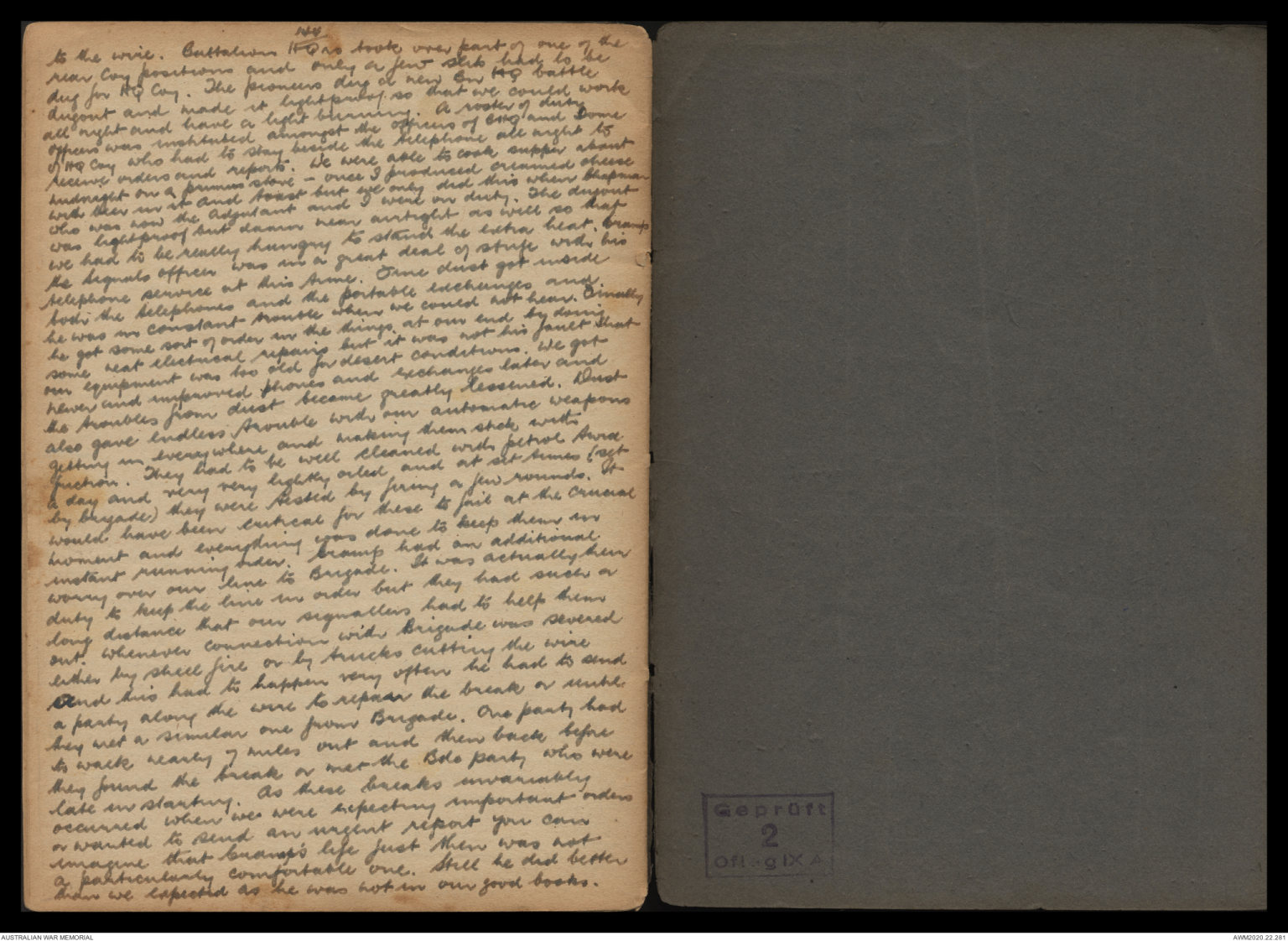
126
plane might xxx drop eggs on us. The searchlight display
over Alex during our airraid was a brilliant spectacle,
but we were too far away to see any planes. Only once did
we see one scooting for home and held the beam of
the nearest light to us for a few moments. No AA chased
him however. Our canteen had to work under difficulties
in a marquee and we had to allow the men to take
a ration of bottles to their tents to prevent a gathering
together. Of not we would have had the whole battalion
milling in one place and all the efforts towards dispersion
gone by the board in the event of an air attack during
this period the casualties would have been enormous
-all for a beer. So usually a couple of orderlies with
the Platoon Commanders that bought for the whole platoon.
Mess hut but were also broken down to Platoons and well
scattered. Blackout was completely enforced and no
lamps were issued so that as soon as dusk fell everyone
had to go to bed. It meant going to bed at 6.30. Some
Officers mainly Company Commanders were allowed
lamps and this had an electric one run off a car
battery. We had a rain storm overnight and the
water bank around my tent broke. As there was so
little excavation there was no great width of earth and
water coursing down the rocky hill soon got in
and my dugout was flooded to a depth of about nine
inches. I was in bed and as I had undressed
upstairs the only thing left to float were my slippers.
I had my last dose of sandfly fever here and I went
down to the camp hospital. Harry Furnell decided
I had to be examined properly so his second in command
ran the rule over me thoroughly They tested me for
kidney trouble and were waiting for me to get a
temperature before taking a malaria test. You must
have a temperature or you get a negative result straight away.
He tried me for appendicitis and I really think frightened
the trouble completely away by finding one small
tender spot over my appendix, since this bout I
have not had a recurrence. Another thing we had
to learn during my stay here was to ride a motorcycle
all officers had to be proficient. I learnt fairly well and
quickly and had no falls although the ground was
very bumpy. I was able to ride around the camp sometimes
127
and saved myself a lot of walking I called it practice .
We had plenty of space and the ground was reasonably
clear so we made three or four football grounds, and
started a Company Competition. Battalion Headquarters
only had about 30 all ranks but we managed to provide
a team in which I played and we won our first match
against D Coy, drew with 6 Coy and were beaten by my
own company. In the match against D Coy I hurt my
knee - I think I was kicked and it caused me a lot
of trouble later. One day the Brigadier came over and
presented all our pennants from the Brigade sports
at Palestine and gave us each our individual trophies.
Each member of the winning teams got some small
memento and it took quite long while to go through
us with so many. I got a small pocket wallet of
tooled leather. Incidentally the band as I told you
had lost its bandmaster Trahain in Palestine and
had fallen on evil days. I started on it and
reinstituted its early morning March around
camp at reveille and it also played on the Guard
at Guard mounting. It soon began to improve again
but when we left Ikingi its instruments were never
used again. When we arrived we found in our area
a burnt aeroplane and it caused a lot of interest
and was be source of a lot of conjecture and investigation
What really happened was that a British plane coming
home could go no further as the pilot had bailed out and let
it crash. It caught fire and was completely burnt out.
It furnished us with all sorts of things - wires and
bits of fuselage were manufactured into lots of things. When
we had to train on tank hunting we used part of the
tube structure to make skids or runners for a dummy
tank and built the frame of wood and hessian.
It was to be towed behind a car. We were without
showers in this camp and had to send the water cart
around the Company’s, twice a day and water was
stored in kerosene tins by which we came by dishonestly
as one was able to wash in more than a pint of water
and it was a glorious day when we were invited
down to one of the houses used by the Army Post
Office and had a shower. I also had a long bath
whilst I was in the hospital. It became the fashion
as soon as an officer got leave to go into Alexandria
128
to go to the hotel and have a haircut and shave and
shampoo and then a wonderful hot bath, leave was
not too frequent in Alexandria and leave parties for
troops were carefully rationed to cover the requirements
of the Egyptian Railways. I think most of the troops got
in once and some twice. The Australian Comforts fund
had taken over a hotel - The Atlantic but no liquor
was sold. They provided a bed and meals and nice
facilities I can tell you more about it later as six
months later I spent a week here on a job. It was
not until just before we moved that we were able to grant
Overnight leave to officers. Theo had for a long time
travelled daily to his job - the special one but he was
how back. We were at Ikingi a little over six weeks
and in this time we did Battalion, Brigade and
Divisional Exercises. There was only a few days
break between Brigade shows and here were
filled in with Battalion ones. We had two Divisional
ones. I was with the Bn on be first one but was an
umpire on he second for the enemy. I was Chief Umpire
and the Brigadier of the enemy Brigade led me a
pretty dance. I shall tell you what I thought of him
myself. Theo got conjunctivitis or inflamation of the
eyes through dust probably and had a weeks leave,
That prevented me from going on leave and just before
Ive left he came back and I succeeded in wangling
overnight leave and the next day. Before his I had
been twice into Alexandria - both times on duty and
had no time to spare for dalliance. The entrance to
Alexandria from our side is along be Rue des Soeurs or
Sister Street - a very long narrow street in the native
quarter - with no traffic rules and a cardriver has to
be constantly on the alert. Native gharries- cars trams
handcarts and worst of all heavy narrow little carts mainly
carrying cotton to and from the wharves and warehouses
and drawn by two donkeys wander from everywhere
and to everywhere. They shoot out of narrow lanes with
the most careless disregard of what is coming. Truly
they don't need to worry as anything that hits them
comes off a bad secondbest. Combined with thousands
of civilians who wander every where its a harrowing
drive. There is a single tram line in parts and you
129
can never be certain whether it is coming or going. Sister
Street is well known as the brothel area but this is not
strictly correct. It runs into Mahomet Ali Square a very
big place and this is the real den of vice and sin although
some of it flows over into Sister Street. I have heard some
hair raising tales of this place. The City of Alexandria itself
is a city of fine buildings - not skyscrapers and fairly
broad streets and large squares. It has a beautiful
promenade right along the seashore - in places 100 yards
wide, I believe the suburbs - that is the suburbs of the
white and also the wealthy people are very beautiful but
I never saw them. There is a much larger proportion of
white people living in Alex which gains much of its wealth
from cotton. It has a very large Greek colony as well as
most of all the European peoples. Its night life is made
up of cabarets and picture theatres and there are a
number of very good hotels of which the Cecil is the most
famous - just like Shepheards of Cairo. This was based
on Alex for his job and he soon found that hotel life
was too expensive and he went to a pension of boarding
house. There are many of these and the proprietor usually
takes the complete floor of a building. They are as far as
I can make out very nice and much cheaper than
the hotels even after allowing fir their special tariff for
officers on leave. My first journey in was a quick one
to get some papers signed by Theo and to visit the
Headquarters at Mustapha Pasha barracks. At the same time
I investigated the possibilities of purchasing primus stoves
for the unit and left the results for Theo to look at. Next
time I was equally as quick for I bought the primus
stoves. One each for a platoon and five bigger ones
for Bn Hqrs, officers and Sergeants. We had been advised
to buy these for cooking in the desert and it was the
best advice we were ever given. They proved invaluable
as most times after leaving Ikingi it was impossible
to even do Company cooking. About this time the
Brigadier also did the same for Brigade Hqrs mess
but they went further and bought a lot of very
expensive gadgets and dust proof containers. We, as a
mess could not afford them and in fact as events
turned out did not need them as we struck very
little dust. Just before we reviewed or orders to move
Theo came back and I got overnight leave. I went
in about 5 oclock and did the usual things.
130
Booked a room at the Cecil - and shaved and had a
haircut. Then the first delight. A long hot bath and
clean clothes and then to the bar. No one dines at
the Cecil so I went to the Union Bar run by some
Greeks and had a steak and a bottle of beer all
by myself. I cannot remember now who I picked up
with - someone from the bar of the Cecil to which I
had returned and we spent the night at the Carlton
Cabaret - supposed to be the best in xxxx Alex. We drank
and after the turns had finished danced with the
artists who came from every country - there were
Americans, Spanish, Bulgarians, Greek and I went
to the Cecil about midnight and got into a large bed
with beautiful sheets and completely relaxed. I next
remember next morning about eight oclock when I
woke up very hungry. I used the phone and rang
room service and ordered porridge - toast coffee
and an omelette. These I had in bed and then
savoured all the joys of leisurely shaving and
particularly bathing with all the hot and cold water
I wanted. I wandered downstairs about ten oclock
and decided the best way to start the day was to
have a beer. Then I began thinking of where I should
lunch and what I would do for the day when I
was called to the phone. Nothing less than an order
to return immediately and that a car was on the
way in. All I could do was to dismiss all my
tentative plans and after a few quite drinks with
a chap I knew the car arrived and I went back
to camp with my leave curtailed to find our orders
to move and all preparations to be made. I have
just remembered one other leave I had. I more or
less demanded a nights leave and we got into Alex
about nineoclock - Bamford Russ Godby and I and
called on Sol Green who had drawn a four days
leave. He was beautiful. A Gully Gully man
practices in the bar of the Cecil and his sleight
of hand tricks with snakes chickens and mice
are very wonderful. My memory is terrible. I have
just remembered that it was the same night as I
had my overnight leave but Bamford and Russ came
131
in for the night only and that we only had our dinner
together at the Union Bar. I shall come back to that after
I finish with Sol and the Gully Gully man. Just before we
arrived Sol had been watching and apparently had been
picked by the artist for a snake trick. When he pulled the
snake out of Sols shirt Sol either took it or made a grab
and the little snake bit his finger and they had the
devil of a job getting it off. Its venom had been extracted
and there was no danger but Sol who had been having
a most wonderful four days was finishing his leave by
drinking as much as possible. Finally Bamford and I
put him to bed for a sleep and picked him up after
dinner when he had sobered up. In the meantime we
had ours at the Union Bar and with Sol went to the
Carlton. Apart from the dancing and drinking we did
there the only excitement was meeting a Polish officer
who was very drunk and before we knew what he
was doing he kissed us all round on both cheeks.
We were wary of him after that but he caught most
of us once again including me and Russ Godby three
times. During our exercises both by day and night
we met all sorts of things. The true sandy desert
the true Bedouin travelling about with his funny
little low tent and all his possessions - and scorpions.
I have never been bitten by one but have seen the results
on others. The pain is very terrible and seems to
paralyse the limb without deadening the pain. One
other little pest we had was the scarab beetle xxx
it was rechristened by the troops. It seemed to live
on any refuse and how it lived until we came
Lord knows. It was a black beetle with a hard shell
and grew to about an inch in size. I have seen
larger than this. We had a queer experience one night.
Three or four of us were standing just after dusk near the
trees when we thought we saw the ground heave a few feet
away. We became curious and went over and saw a
hole about the diameter of a tent pole in the sand. We
poked a stick down and felt something give and
immediately thought of a snake nest which was
something we really did not want near us. We got
a couple of men with picks and armed ourselves with
weapons and waited whilst they commenced
digging. You can imagine the relief and laughter
132
when the pick uncovered a [[huge?]] colony of these beetles
about 500 of them and it was into this living mass
we had poked our exploratory stick. None of us had
ever seen so many together in one place before and
truly - never again. We had a couple of unofficial
parties at Ikingi. One in Sol Green and Bamfords
tent. Patterson had come over from Brigade and we
had a few drinks and then persuaded him to stay for
mess. Later he did not want to go home so we went to
Greens tent with more beer and Russ Godby and I found
some eatables from recent parcels and we spent a quiet
and enjoyable evening swapping stories and eating our
delicacies. It was then I got him to promise us to take my
snaps for you and he turned up one morning a week
later and you have the results. On my birthday McQueen
and McGeach invited Hugh Johnstone of the Ambulance
along and then got hold of me and we had an uproarious
time with whiskey, beer and a cake. If I remember rightly
one of them was from you. We finally ended the evening
with a scuffle in which Russ Savige on the way home
joined - he was the only one hurt receiving a stone
instead of a piece of dirt on the chin. We had another
sort of party. Theo and I had tents of our own somehow
Theo started inviting Coy Cdrs for asparagus and Fish
with a bottle as Hor D'Oluvres before mess. It was alright
as long as the parcels lasted and we finally ended up
by cornering the market at the Canteen for asparagus
to continue them. Incidentally darling I think I told you
of the coals to Newcastle gift in one of your parcels. We
had been living on Bully Beef in all forms and particularly
on all our exertions in its natural form for so long that
when I opened a parcel and found you had sent a tin
of our staple diet I am afraid my face fell until I saw
the humour of it. we soon found that raw onions were
the diet for Bully and the lessons we learnt on those
exercises meant a lot in the desert after Bardia and
Tobruk. Whilst at Ikingi we had a tour of Security
Duties and our job was guarding two aerodromes near
us. Nearly all the Battalion was used on this and
although they were not used very much just them they
were very important. In all my visits of inspection I
never once saw a plane but they were in use all the
same. It was at Ikingi that we had our first
lot of reinforcements - over a hundred in which
133
Young Leversha was one. They were not very well trained
due to the lack of equipment and it took us a couple of weeks
to shake them in. I had to do the drafting to companies
and I struck one unusual problem. In this draft were
three sets of three and one of four brothers. It was a standing
rule from Pucka days that no brothers could be in the same
platoon and if possible company so I had a lot of explaining
to do. As all of them wanted to be together it was a bit hard
on them at first but they saw the reason behind the order.
Almost as soon as we arrived we were instructed to place
our orders for Christmas Dinner and for this we could have
Turkeys and Hams and Puddings. After soe thought
we decided on Turkey, Baked Potatoes & Christmas Pudding
and from our oven funds to provide a bottle of beer a
man. As I told you the ovens were the trouble because
of fuel - wood was scarce and we could not get enough
for the Aldershot ovens so we saved sump oil. About a
week before Christmas - I should say ten days we received
our warning orders to move so our Christmas dinner was
held on the 19th. The cooks did a marvellous job and
there was plenty to spare. The only fly in the ointment was
having to eat it at midday because we were leaving
next day but the main reason was no blackout. Another
Army was we could not afford to have anyone drink next
day. In the mess we had our own at 5 oclock and
by eight oclock had finished a most wonderful meal
by finishing all our liquor. There were a few good stories
told and some very bad songs sung and every one was
happy. We broke camp next morning - fortunately leaving
our tents standing and what a morning. We marched
out to the station about six oclock 200 yards between
companies with the band playing - full marching order
and bitterly cold with a shockingly cold wind which
had fortunately not stirred the sand as yet. We arrived
at the station and with the usual habit of Egyptian
Railways we sat there until past midday before our
train arrived. The Sun came out and things became
a little more cheerful but amongst the officers were a
few sore heads from the night before. When the train
arrived we had some trouble in loading our carriers
as one of them fell through an earth ramp to the
loading platform and tore off a track. Keith Walker
and his men worked like trojans and got it on again
134
3 seconds after the flat car had pulled out. We got it
back and loaded and tied the carrier on in record
time. Even then it was not until half an hour later
that we finally pulled out - few knowing anything
of our destination but all knowing that we were
on the way and this time much nearer to coming to
grips. Spirits were high and excitement made everyone
cheery and happy at the thought of action at last after
all the weary months of training. Both Theo and I knew
that for the present Henry was not coming back though
there was still a chance. In the meantime I was to still
to carry out the dual role. Before I go on to the next stage I
must tell you that it was at Ikingi that I next met Sergeant
Oriander who was in Div. Ordnance and had something to do
with the station. He invited me to a Sergeants mess Party at
Div H.Q but for many reasons I preferred to excuse myself.
I just feel here my darling one that I must tell you I love you
madly. We rattled along the railway in a high cold
wind. The crews of the carriers had to ride with them
for two reasons - to prevent movement from the lashings and
foe a/a protection - they had a bad ride. We were late starting
and with delays on the way arrived about midnight at
our destination. Sedi Hanneish about thirty miles the
other side of Marsa Matmah. As we got out of the carriages
a blast hit us. A cold wind absolutely laden with
sand. It stung everywhere it touched and quite apart
from the sand it was difficult to keep your eyes open
from the force of the wind. We all either turned our
backs or got into the shelter of the one station building
whilst our stores were unloaded onto a transport
which had come up the road. The carriers went on
with the train to Marsa Matmah where they were to be unloaded.
Then we started to march with the guides into the wind.
It was terribly hard and showed up the physical fitness
after Christmas of a few and as whipper in I had my
hands full. We obtained some measure of relief by using
one of our anti-gas eyeshields - a piece of celluloid which
is carried flat but folds and closes into a shape rather
like goggles. After two miles we turned off the road into
some trenches - part of the earlier defensive scheme
and everyone was glad to crawl into dugouts out of
the wind. Next day we had a clearance of all surplus
kit etc. and a dump of kitbags - band instruments - suit
cases and all surplus gear that the man or trucks
135
could not carry. Crawford and a guard were left over them.
It was a very drastic clearance. The same day Theo left
on a reconnaissance forward and I was left in command.
Near us was an are4a covered with broken down cars, trucks
and motorcycles and as we only had about one half of our
needs in transport we made raids and our mechanics made
about three trucks and eight motorcycles out of parts of others.
Their zeal for acquiring trucks let me into a pretty mess.
One day a new three ton truck arrived which after enquiry
they convinced me had been abandoned. I had to believe
them and they painted our unit sign and number on it.
Next day a very angry Indian arrived and claimed it.
He had spent most of the day searching for it and actually
would never had seen it if an ASC Cpl had not told him.
Our bright lads had pinched it from him. I finally had to
go down and apologise to his Commander who got a much
greater shock when I told him we had had the truck in
our possession since two oclock the previous afternoon.
As I was leaving I met the Havildar in charge of the truck
and received a glance of concentrated hate. Amusing but
it could have been serious. We spent Christmas in this
place and there was nothing extra this time. John Young
a little later was able to get four dozen bottles of Australian
Beer and we shared this out amongst the Officers and
had a party the night before leaving. I was able to go
about 6 miles to a NAAFI and buy a packet of cigarettes
for each of the troops and again once before leaving. It
was here that the first glimmerings of a canteen of our
own came into being. We received our orders to move
forward and after our clearance we packed all our
available transport with essentials and then sent
the rest to our dump. About 3 oclock we get orders that
the balance of our transport would arrive at 5 oclock
It actually came just at dusk and we had to unpack
send trucks to the dump for needed but not so essential
stores and repack all vehicles. We also had attached
a truck from ASC with a water tank to supplement
the small one of our own which was nearly worn out.
We worked late and then had some beer and
went to bed. The start was timed for that very
elastic military term "First light" and our troops
were to carried by N.Z. A.S.C. I was up before dawn
and as our place in the column had to be very
closely judged I was very worried when the troop
carrying lorries were late. It was very cold and
with a biting wind. Fortunately but wrongly other
136
units on the road before us were late and our trucks
arrived in time to be filled and we were ready. We
had to move along the road with an interval between
trucks of at least 100 yards against aerial attack and
I now had my first experience of leading the Battalion
in convoy on the road in daylight. We had about
105 trucks or vehicles in the convoy and that meant
the Bn was spread over 5 to 6 miles. It was the first
but not the last time. We had all our weapons ready
for air attack and went forward. Our carriers were
to make their own way up from Mersa Matruh and
to catch us up. they could not travel as fast as we
could. Our first stage was to Buq Buq and on the
way we passed through Mersa Matruh where the British
had built a defensive system. It is also famous as
the seaside resort where Antony and Cleopatra came
to spend a weekend or three weeks away from Alexandria.
By the way I forgot to mention that Pharos Tower is at
Alex and is the first lighthouse in the world. A
huge fire was kept burning night and day by an
order of monks. Past Mersa Matruh we struck roads
that had been damaged by British Engineers in the
retreat before the Italians. They had blown bits out
of the macadam every 30 yards or so and it was
impossible to get up any speed before having to brake
to negotiate [[m?]] six inch blows. If taken full speed
all the trucks springs would have broken and in fact
some did but the troop carrying had a
number of spare trucks to cover this eventuality.
Just past Mersa Matruh we either crossed an aerodrome
or drove past one side of it. A plane had apparently
just taken off and following custom had fired a
testing burst. On of the bullets had hit a man in
the sixth Bn in front of us and gone through his
head. The RAP usually travels at the rear but
I forget why theirs was not and they asked Russ
Godby to attend him. He thought he would die and
heard later he did but with no confirmation. I feel
I have not given you the right idea or described
the shocking destruction of a good road. It was a
hairraising trip of bumps every 30 yards. The next
place we passed was Sedi Berrani to which the
Italians had reached. We passed through the town
137
and saw the results of a naval bombardment carried
out by the British Navy prior to our retaking the town
some months before. There was a statue to Mussolini in
the town with a very vainglorious tribute which tempted
every one. Some others had shot at it. The British made
road ended a few miles before Sedi Berrani and we
expected a good road from there on. However the Italians
had not completed the road. They had metalled it but
had not bound it with tar. For about another 20 miles
we had another experience of travelling slowly on
road metal. In some places it was about 3 feet
thick and in others much thinner. We could in some
places get off the metal onto the desert but it was not
advisable as the consequent heavy dust both showed
up to the air and covered the troops. We mainly kept
to the metal but it was very slow travel xxxx the road
was in all sorts of stages of completion. About 10 miles
from our destination we got onto a beautiful road
and were able to crack on speed but it is not advisable.
If the head of a column does or rather suddenly
increases speed from 20 to 30 mph the tail is soon doing
60 to catch up. We arrived at our destination which
was not actually Buq Buq (pronounced Buk Buk) but
opposite to it. It was actually on the coast and was
an extremely difficult place to find as it was all
underground. We dispersed off the road on both
sides and prepared a meal without fires and issued
orders for the start next day. We were to start round
about 8 oclock which gave the troops time to make
tea on their primus stoves. Just as we were moving up
in my truck to start our trip Theo's car arrived
for all Coy Cdrs to go forward on reconnaissance.
Our stage this day was to Soluar - not so far and
with a better road. Before I leave Buq Buq I must
tell you that in the dusk my driver who had
gone for petrol and oil missed the peace he left us
and we could not find him. In the end I had to
borrow a couple of blankets from the RAP store. In
the morning we found him 300 yards away. In this
area we found all sorts of discarded Italian
equipment. Millions of rounds of small arms
ammunition, mortars and bombs - odd rifles
138
all thrown away or or dumped in their retreat. After seeing
how the Italians built their roads and prepared them and
then running on them I give them full marks as road
engineers. Later I was to appreciate even more fully their
road genius. We carried on all day and as mile followed
mile worry about air attack lessened but to me it
was any ever present fear that we would be attacked
whilst I was in command. We arrived at the foot of
the escarpment near Solum and I think we were met - yes
I am certain - by Jack Bishop and told to disperse
off the road and await further orders. We found an
area in a great salt pan and I dispersed the Bn
with as great an interval between trucks as possible.
We had lunch and about 3 oclock I received orders
to start at 4.30 and go up the escarpment by
Halfaye Pass (or Hellfire Pass) about 2 miles ahead.
The escarpment by the way rises very steeply from
the plain on which we were on to a height of about
600 feet. During our wait there was a dogfight
between some Italian planes and our Gladiators
but too far away to see with the naked eye. We
only had one pair of glasses in the possession of
Carstairs and he gave us a brief and very
unsatisfactory account as even he could not
distinguish the combatants or the outcome. A little
before 4.30 I had the Bn mounted into trucks when
just before I was going to whistle the advance I saw
a bomb attack on Solum and Halfaye. it was
my first experience and I did not know whether
to wait or carry out my orders and drive right
into it. I spent a few moments of indecision - not
from great personal fear but fear of doing the
wrong thing. I decided to go ahead and the attack
passed as we drove up the road. Theo told me
afterwards that he was at the top of the Pass and
got into it. They jumped out of the car and lay
flat and so escaped. I might add that every one
now was ready to stop and get flat as soon as
attacked. The road up Hell Fire was an old one
and twisted and turned in a marvellous
fashion. I would have been a death trap to be
caught on it as there was no way to go except a
cliff one side and a sheer drop the other. I can
139
tell you I breathed a sigh of relief when we safely
got over it and arrived on the wide plateau on top
and I could get some space. I met Theo on top with
a Major Carmichael of the Argyle and Sutherland Highlanders.
We were to disperse and at 7 oclock which was dusk this
Major was to guide us across ∧ coming to Oort Capuzzo. As soon as
I arrived and it was dark we closed the column up
to "nose to tail" and started off. He had guides out
and we slowly made our way. It was an eerie feeling
going into the unknown - the darkness in the desert
feels very close. Somewhere between Halfaye and
Capuzzo we crossed through the wire which marked
the frontier into Libya but it was some days before
I actually saw it. We arrived at the Fort and met
Theo and the Coy Cdrs. On the way a message was
passed along that the convoy was broken. We halted
and I spent half an hour in unknown country
finding the missing portion. It had occurred through
one truck hitting another in the dark and damaging
itself. There was really no excuse for one truck stopping
twenty but it was inexperience. When we arrived
we had rather a hectic time as we had lost another
part and this had to be found. The Argyle Major was
getting a bit impatient as the NZ Troop Carriers were
to take his Bn out and he in turn did not want to
be caught in Hell Fire. we passed around the Fort
buildings onto the Aerodrome and the Coy Cdrs took their
Companies into the area they had reconnoitred. We collected
the Troop Carriers and sent them off with Carmichael.
I may have been wrong but I think our Scotch friend
looked on us as amateurs. His Battalion had been in
the earlier victory and had some very severe fighting
just before Capuzzo. I sensed he thought that we were
just civilians. Still we showed him and i would
like to meet him again. In the morning we had
some adjustments to make and after digging slit
trenches were able to look around. As I said we
were on an aerodrome near the Fort and it was littered
with naval shells which had been pumped into it.
There were some 12 or 15 inch shells there - naval
shelling is not very useful on ground as they are
Armour piercing and in consequence do not always
explode in earth if their armour piercing nose does
not find something hard enough to smash it. The
140
Fort itself was an ancient Turkish or Arab fort built
of soft stone and surrounded by stone works. I was
not able to explore it as I had no time for exploration
then. Our Battalion Headquarters was near a small
mound about ½ mile from the Fort. It was an ancient
troglodyte dwelling - and ancient cave dweller Capuzzo
was important from a modern aspect. The Italians had
developed this place as a water point and had installed
a number of pumps and had made a concrete area
around them. The wells themselves could not supply the
demands required of them so that a pipe line from Bardia
had been laid and water brought from there. Early in
the war we had advanced into Libya and when we withdrew
we had salted these particular wells. All the water we drew
from there was heavily impregnated and it caused surprises
that men could drink this strong solution and not be ill.
What actually happened that our bodies were crying out for
extra salt to replace the vast amount we lost naturally by
perspiration. Whilst at Capuzzo I had to answer some questions
from the Brigadier as to the time I had commanded my move
forward the night before. I had followed my orders faithfully
but the Bn had advanced ahead of the 6th which caused
a lot of confusion for their timed schedule allowed for
their relieving the Queens before us. Apparently the 6th had
not moved on time and we were ahead. So I did not get
into a row but the officer temporarily in command of this
Bn. All the morning there was a high wind but little dust
and we just had to remain sheltered from it and stop
any movement of troops to avoid disclosing our presence
to Italian Reconnaissance planes. Just after lunch we
received orders that we were to take over from the 2ndBn
in front of Bardia. Theo went ahead to contact them and
reconnoitre and on receipt of a message I was ∧ to send
the Bn forward arching down the road but dispersed
and not on it. They were to go by Companies. I think
I forgot to tell you that Miller was unwell the last week
at Ikingi and on the last day Theo ordered Russ Godby
to examine him. He was found to have some heart
trouble and was sent to hospital. By the time for
moving arrived the storm had developed and
you could not see 20 yards ahead. I went to the
road junction at Fort Capuzzo and all the companies
had to report through me. It was terribly hard to
see them in the dust and in fact one platoon
got past without seeing me or I them. You can
141
imagine perhaps how jumpy I was in case they
missed the road in the dust storm and went too far in
the wrong direction. I was very glad when the last
company had passed through my checking point and were
on the right road. I then had to collect all the transport
and stores which had not accompanied the Battalion in
daylight and started off with them in the darkness which
was now on us. It was rather a hairraising trip as the
road had two deep ditches - one on either side and we
had to travel without lights. Two or three times, large
heavy trucks travelling fast (because they were going
away from the enemy and knew the road) forced us
hurriedly to the side of the road and our trucks broke
the foot wide sandy edge and had to be dug out.
These accidents delayed us a bit but about midnight we
picked up our guides on the road and I was able to report
to Theo that the Bn plus transport was in. It was not
until nearly two oclock that the relief was completed
as the companies of the 2nd were at a good distance.
We had our first casualty during the relief of B Coy were
in the middle of taking over when the Italians commenced
to shell the area. One of our men dropped down on his
face as the shells got near and one shell whilst he
was face down hit the ground just under him. It
tore all his equipment in the front off and made a
hole in his tunic just over his stomach and rather
badly bruised him. Fortunately for him it was a
dud and did not explode. He was evacuated next
morning with shock which took all that time to
manifest itself and ∧ he must be considered one of the
very lucky men of the war. We occupied the positions
dug by the 2nd Bn. They either dug slit trenches for
two men or on rocky ground built sangers (that is
round walls of rocks) the depth of slits and the height
of sangers was about 3 feet. There was a little delay
whilst we were waiting for a message advising the
completed relief of one of the companies. The shelling
I had referred to had cut the telephone wires and
the break had to be located and repaired. Doing
this one of the 2 Bn signallers was shell shocked
due to a burst close to him. It was finally
completed and we were left in possession. OReilly
was waiting for me at BHQ and about 2.30 we
started off for a hole in the ground he had
142
selected and set out my bed or rather valise. We had
only about a hundred yards to go in beautiful moonlight.
The storm had died out completely but it was very cold.
Even so everything looked the same and it took us over
half an hour to locate it. It was my first experience of the
sameness of the desert and how careful one had to be.
Landmarks were few and a compass bearing absolutely
essential if you went further than 100 yards from your
position. The Bn before had used compasses to go out for
necessary acts at night. We were very short of compasses only
having five and these had to go on patrols so we had to
be very careful or pay for carelessness with much [[scard?]]
next morning we woke up and looked around. We were on
a sandy flat with a slight rise in front which concealed
the perimeter defence of Bardia from us. In fact Italian
Artillery found it so difficult to obtain observation because
of these slight rises in otherwise dead flat ground that
they had ladder observation posts built to increase their
field of vision. It was rather tantalising to see one of these
towing behind a tactor. We were occupying a very large
area on the left of the Brigade. The 6th were on our
right and the 2/1 st on the left but there were large gaps which
it was impossible to cover. The sand was dotted with small
sangers well dispersed and in odd spots were a couple of
derelict cars and two damaged planes. Among the
debris we picked up the regimental crest of the 62 Italian
Regt cut out of aluminium. As 62 was our unit our
sign this went with the crest onto the tailboard of
BHQ truck. They were both about two feet high and
made us feel very proud. The forward companies could
see much more than we could and we received
constant reports of Italian working parties and
movement. In front of one company there was a huge
dump of damaged trucks and between another and
the wire there were two big heaps of firewood some 100 yds
long and 50 yds deep. Just the same as in Egypt
firewood was scarcer than hens teeth in Libya and
these were part of the Italian supplies. We had taken
over the BHQ of the 2nd Bn. This was simply a hole in
the ground about 4 feet deep and about 10' x 6' . Sandbags
to about the height of 2' more more made the roof a reasonable
height. The whole was covered over with some galvanised
iron and one more layer of sandbags. Then sand
over the lot effectively camouflaged the whole show.
The sent for their sandbags later but as we were
moving our position forward they had them with
143
our blessing. McCorkell had been up with Theo on the
reconnaissance the day before and he knew a little
about shelling. About eleven oclock we had our first
experience when a few odd shells landed about 200
yards away. All we heard was a dull whoosh and
after the explosion we looked up to find the result.
No one was hurt by this desultory shelling during
our stay here. Two of the shells were duds so we called
the Engineers to blow them up. They arrived about an
hour later - very nonchalant with their pockets f
with guncotton. They made their preparations and
sat the fuse going with a long slow burning piece and
then hared for home and mother in their truck.
The shells were duly disposed of. Most of our time before
we attacked was spent in phoning a shelling plan and
the time we were shelled to Brigade and if possible the
direction of the the flash of the gun if any. By this plan they
coordinated the whole front and many Italian guns
were put out of action or battery positions discovered
or suspected which received special attention then
and during the the opening barrage. They had of course
other methods as well and used the lot. Theo spent
a lot of time the first day and part of the next in
reconnaissance of the positions we had taken over.
After a careful survey he obtained the Brigadiers xxxx
agreement to move forward to a new position with no
more danger and 1200x nearer the enemy. We have
always wondered why the 2nd Bn did not do this before
we did. Another thing they told us was that any
movement of men and transport round BHQ brought
shells down but it never occurred to us. Not that
we allowed anything but the minimum. Our fighting
or A Battalion transport was parked about a ½ mile
back and the mechanics worked in an old but very
large Italian tent. Our B eschelon or administrative
and kitchen trucks were Brigaded under Jack Bishop
and were back some 15 miles just at the top of
the escarpment near Halfaye Pass. They brought xxx
us two hot meals - just after dusk and just before
dawn. Naturally the midday meal was cold. Our
move forward was carried out at night and the rear
companies occupied the forward companies positions
while the forward companies had to dig new positions
This was all done during the night and by next
morning we were entrenched 1200 yards nearer
144
to the wire. Battalion HQrs took over part of one of the
rear Coy positions and only a few slits had to be
dug for HQ Coy. The pioneers
dug a new Bn HQ battle
dugout and made it lightproof so that we could work
all night and have a light burning. A roster of duty
officers was instituted amongst the officers of BHQ and some
of HQ Coy who had to stay beside the telephone all night to
receive orders and reports. We were able to cook supper about
midnight on a primus stove - once I produced creamed cheese
with beer in it and toast but we only did this when Chapman
who was now the Adjutant and I were on duty. The dugout
was lightproof but damn near airtight as well so that
we had to be really hungry to stand the extra heat. Cramp
the Signals officer was in a great deal of strife with his
telephone service at this time. Fine dust got inside
both the telephones and portable exchanges and
he was in constant trouble when we could not hear. Finally
he got some sort of order in the things at our end by doing
some neat electrical repairs but it was not his fault that
our equipment was too old for desert conditions. We got
newer and improved phones and exchanges later and
the troubles from dust became greatly lessened. Dust
also gave endless trouble with our automatic weapons
getting in everywhere and making them stick with
friction. They had to be well cleaned with petrol twice
a day and very lightly oiled and at set times (set
by brigade) they were tested by firing a few rounds. It
would have been critical for these to fail at the crucial
moment and everything was done to keep them in
instant running order. Cramp had an additional
worry over our line to Brigade. It was actually their
duty to keep the line in order but they had such a
long distance that our signallers had to help them
out. Whenever connection with Brigade was severed
either by shell fire or by trucks cutting the wire
and this had to happen very often he had to send
a party along the wire to repair the break or until
they met a similar one from Brigade. One party had
to walk nearly 7 miles out and then back before
they found the break or met the Bde party who were
late in starting. As these breaks invariably
occurred when we were expecting important orders
or wanted to send an urgent report you can
imagine that Cramp's life just then was not
a particularly comfortable one. Still he did better
than we expected as he was not in our good books.
 Lawrie Taylor
Lawrie TaylorThis transcription item is now locked to you for editing. To release the lock either Save your changes or Cancel.
This lock will be automatically released after 60 minutes of inactivity.